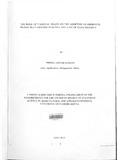| dc.description.abstract | Pigeon pea has recently been promoted by the government and other research
organizations in Kenya due its ability to tolerate moisture stress. It traditionally has
been grown in central and eastern Kenya. However, in Coast province the crop was
introduced in the larger Taita Taveta district on experimental basis in 2004. Since then
the crop has rapidly spread to cover most of the district. While previous studies have
assessed the drivers of the adoption of pigeon pea, none has examined the effect of
variety attributes on pigeon pea adoption.
This study used a multivariate probit and poisson regression techniques to examine
the role of pigeon pea variety attributes on farmers' adoption of improved pigeon pea
varieties introduced in Taita district. It was based on data collected from 200
households in Mwatate, Voi and Wundanyi divisions of Taita district between April
and May 2009.
The study finds that out of the five improved pigeon pea varieties released to farmers,
only three varieties were adopted. These include, Katumani 60/8, ICPL 89091 and
ICEAP 00068. A multivariate probit regression model was used to analyze the factors
affecting the probability of adoption of improved pigeon pea varieties. Results
showed that the major pigeon pea variety attributes driving rapid adoption are drought
tolerance, pest tolerance, yield, ease of cooking, taste and the variety's ability to fetch
a price premium. Group membership, agro-ecological zone, distance to the nearest
main market, education level of farmer and years of farming experience positively
influenced the probability of adoption of improved pigeon pea varieties. Early
maturity, a major focus of recent research, has no effect on the farmers' adoption
decisions. The marginal effects of the multivariate probit model further confirm that
variety traits had the greatest effect on adoption decisions by farmers.
The poisson regression model was applied to analyze the intensity of adoption and the
results showed that variety attributes such as taste, ease of cooking, pest resistance
and drought tolerance positively influenced the degree of adoption of improved
pigeon pea varieties. Among the socio-economic factors, farmer's education was
found to positively influence the intensity of adoption of improved pigeon pea
varieties. Farmer's age, gender and farming experience did not affect the intensity of
adoption of the varieties.
These findings imply that development of improved crop varieties should pay
attention to consumption and market characteristics in addition to production traits. | en |

